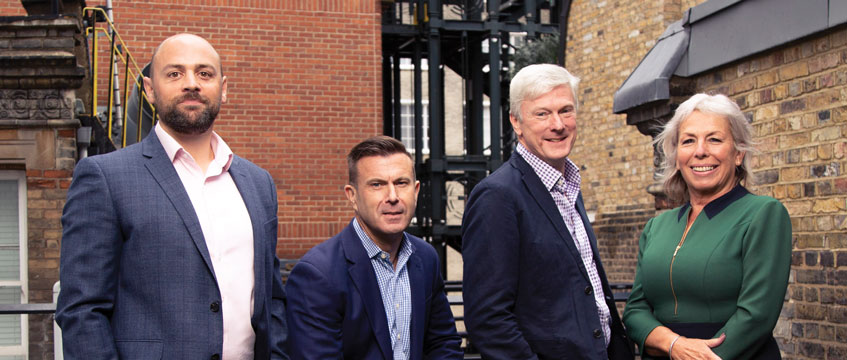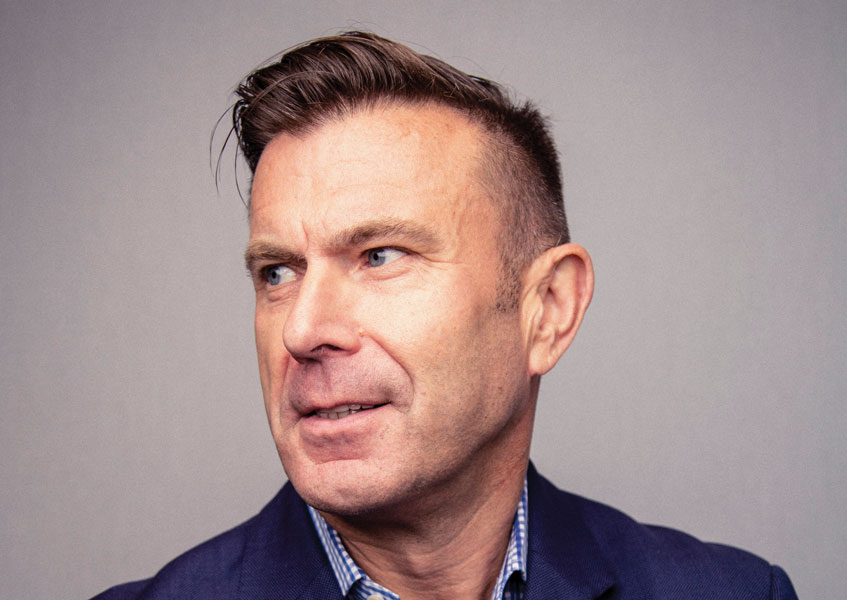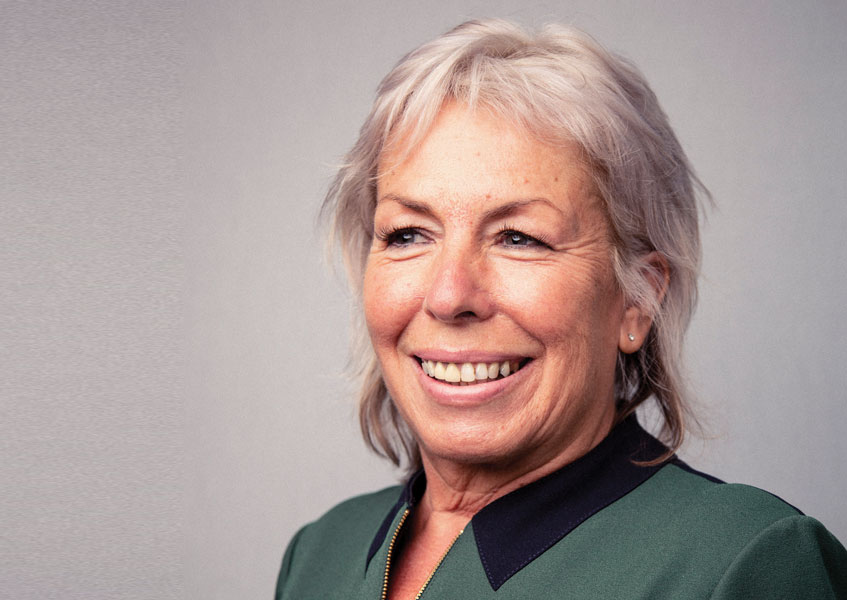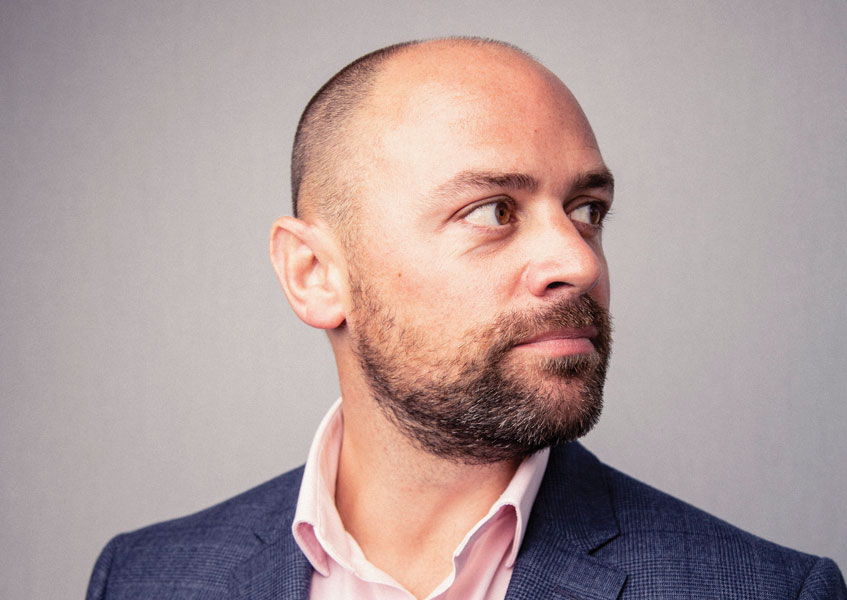As the reins are handed over at consultancy Tuffin Ferraby Taylor, the top team talks talent, innovation and the importance of keeping a sense of humour
[Pictured, left-right: Executive managing partner Alistair Allison and executive partners David Mann, Alan Pemberton and Christine Keates Lewis]
“Growing a successful brand in real estate isn’t about having the biggest boat at MIPIM anymore. Today you have to be different. You have to be innovative and you have to be diverse.”
David Mann’s commitment to innovative thinking and diversity is as bold as it is unwavering. His game-changing work around the industry’s LGBT network, Freehold, has established him as one of the sector’s most forward-thinking champions. And when it comes to the growth of the multidisciplinary property consultancy where he is executive partner, he is not the only one.
Tuffin Ferraby Taylor is headed up by a leadership team of four who apply the same values within the 45-year old company that Mann has become known for promoting in the wider sector. And it is this dedication to diversity and diversification, they say, that has been the key to survival in both good times and bad.
Now, amid Brexit challenges and an increasingly tough market, Mann and partners Alan Pemberton, Alistair Allison and Christine Keates Lewis are gearing up for a new era. Last month marked Pemberton’s last as managing partner as he stepped down after nearly a decade at the helm. Allison has taken over the reins as the firm looks to widen its scope across Europe, strengthen its position in areas including sustainability and wellbeing, and attract a new and diverse workforce including customer experience designers and data managers as well as surveyors and engineers.
EG caught up with the team as they revealed plans for 2020, reflected on how they have built a brand as well as a business, and explained why “being aware of where you have come from”, as Pemberton puts it, is the key to a successful future.
The good place
For TFT, although 2017-18 was a period of investment in which profits dropped 4%, profits returned to growth in 2018-19, increasing by 27%. And in a nod to the power of fresh, innovative business lines, the firm’s sustainability arm saw a 101% growth in revenue between 2017 and 2018. Little wonder, then, that Allison, who joined TFT as a graduate and has worked his way up through the ranks, says he is taking the reins of a company “in a good place”. He adds: “What we are doing is strengthening rather than significantly changing the senior management team,” noting that Pemberton will stay on as senior executive partner.
“It is great to come into this position now at a company that’s not broken,” he says. “Quite the opposite. It doesn’t need any significant structural changes. It is about nurturing what’s already there.”
Or as Mann quips: “It’s there to be broken, Ali.” Said in jest, it nonetheless raises questions. With no major change in management to enforce and a high-level status quo to maintain, how does a new managing partner like Allison make his mark? And is it an intimidating prospect?
“Am I intimidated?” he asks himself semi-rhetorically. “No, I don’t think so. I see this as an opportunity, and the time for a new iteration of the business. I think gentle guidance, continued innovation and continued commitment to diversifying our workforce is what I need to focus on.”
And in terms of making his mark? “I need to make sure we continue to grow and move with the market,” he says. This approach will, of course, form the basis for much of the practice’s 2020 strategy, and diversification is the name of the game. “Brexit isn’t a scary word for us,” Allison adds. “Our work in mainland Europe now accounts for around 5-6% of our turnover, and I don’t see that as a risk but as an opportunity to spread out and continue to grow our work there.”
Allison will also continue to broaden TFT’s remit to support an expanded definition of building performance against financial, social, environmental, health and wellbeing criteria for the likes of the Crown Estate, Grosvenor, British Land, L&G, M&G and Aviva.
Willing cooperation
TFT’s success has stemmed from more than just business output, and this is where the power of the brand comes in. It goes beyond the dedication to all things purple – although the commitment to the company colour is admirably resolute – as the four partners try to instil a culture of collegiate inclusivity from the top down.
“There is a non-corporate approach here,” says Keates Lewis. “That means we have a very engaged style.”
It is this, she says, that helps the practice attract the diverse workforce TFT believes is crucial to the overall development of the firm.
“With a business made up of 140 people it can be very personal, and what we see here as a result is a lot of willing cooperation,” Keates Lewis adds. “We also make clear to all of our staff that nothing is ever a done deal. We are constantly evolving, and stagnation is the ultimate enemy. That’s why we look at how we can grow the pools of people who come into real estate. There aren’t enough people choosing this industry, and I can see why. It used to be a bit snooty, but it’s not anymore, and there is still an image problem that needs to be addressed.”
Keates Lewis says the practice has worked with undergraduates studying on courses with skills that can be transferred into property, and has brought students in for part-time work experience “so they can see what real estate has to offer”.
“We have one undergraduate here from UCL who did a degree in maths and finance, but she is thinking of using those skills to join our monitoring team.”
While the business itself might not require a structural overhaul, there is plenty of change in the pipeline – mainly in response to being part of a sector that desperately needs an influx of fresh talent. So how easy is it really to instil this sort of change?
“We struggle a bit with this,” says Allison. “We are keen to be innovators, but we want to innovate in the right way. That level of trust and the business culture is what we use to attract new talent. We have a business innovation and tech working group where we try to look at what’s out there, embrace it and move forward, but I think we are [at the stage of] early adopters or even sheep when it comes to business tech, rather than really driving it forward.”
For TFT, the power of the brand is more about building a strong internal culture than overcomplicating the business structure or trailblazing: “We can’t be experts in everything,” says Keates Lewis. And this is where Mann comes in.
“I always say I have the best job at TFT, because I get to market a really good brand and really good people,” he says. “But it is not without its challenges. We have to think about everything from data protection and bribery through to single-use plastic. We work with clients including the Crown Estate, British Land and Grosvenor on their CSR policies and make sure we are aligned with those.”
He continues: “We are talking about things that perhaps 20 years ago were seen as a bit tree hugging that have now become centre stage on the boardroom table. I think it helps, too, that everything we have done has always had a bit of a sense of humour, which really helps us stand out. Sometimes, going out of the comfort zone to demonstrate that we do have that sense of humour can take some soul searching, and I have regularly been on tenterhooks about things to see how people will react. But so far it seems to be working out OK.”
2020 and beyond
When a successful growth trajectory is so tied up in the future, it might feel counterintuitive to dwell too much on the past. But, as Pemberton points out, being aware of where you have come from is not the same as looking back.
“The time has come to reposition TFT in a changing market,” he says. “We have had to harness our expertise into one coherent strategy, and we are looking into 2020 and beyond as cautious optimists.
“But while we aren’t looking back, there is a lot to learn from the past. This is a business that has been through and survived two major recessions, and the big lesson we have taken from that past experience is that the worst thing you can do is stand still.”
And so, while there is no major overhaul to execute and no strategic shake-up to action, change is afoot at TFT. All Allison has to do in his new role as managing partner is not break the as yet unbreakable model. No pressure, then.
As EG went to press, TFT announced the appointment of Dan Henn to the leadership team in the role of executive partner, business growth.
To send feedback, e-mail emily.wright@egi.co.uk or tweet @EmilyW_9 or @estatesgazette
















